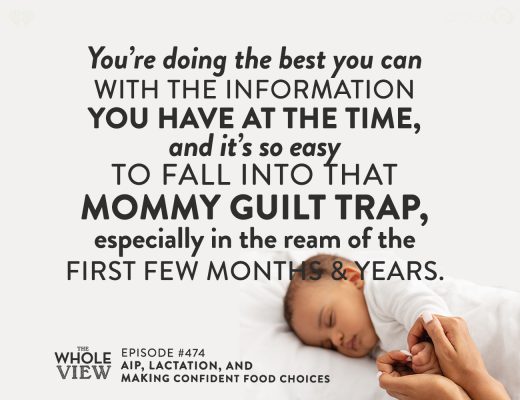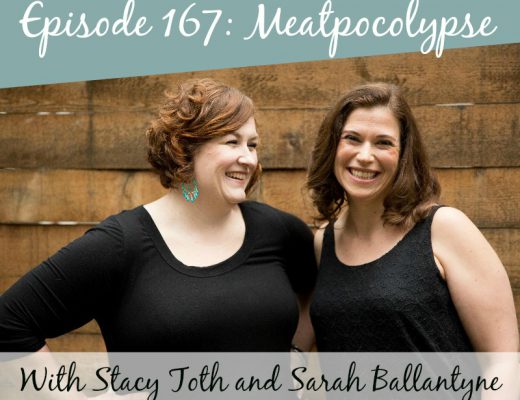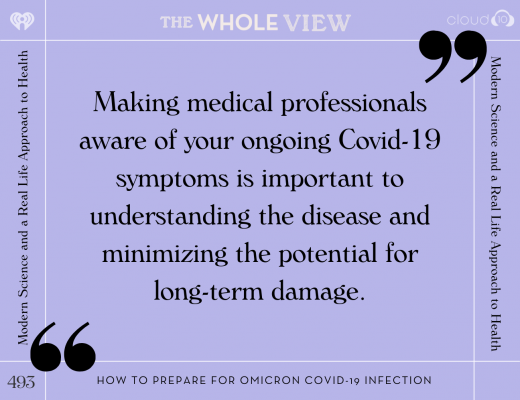
On this week’s episode, Stacy and Sarah revisit the basic points of the Autoimmune Protocol. Sarah breaks down the three phases of AIP, Stacy and Sarah reflect on the role that mindset plays, and the hosts tackle the common myths in a “rapid-fire” myth-busting round-up.
If you enjoy the show, please review it on iTunes!
The Paleo View (TPV), Episode 377: Common Misconceptions about the AIP
Welcome back, listeners. (0:40)
Stacy has some good news to share.
Wesley is no longer vegan.
He lasted three days, and Stacy is super proud of him pursuing something he was interested in trying.
Stacy wanted to give a special shout out to the vegan podcast listeners who reached out and were super helpful and supportive.
Stacy shared more on Wesley’s experiment, how he brought it to a close, and why.
This week Stacy and Sarah are going to go in a completely different direction.
Sarah wanted to revisit the autoimmune protocol as a dedicated topic for a few reasons.
It is exciting for Sarah to see the way that AIP is evolving. However, there are some things happening that are misrepresenting what AIP is.
A Preview Into this Episode
In this week’s show, Sarah wants to revisit what AIP is and summarize it’s main principles. She also wants to address some of the most common misconceptions. (11:46)
The autoimmune protocol is a very comprehensive protocol, and every facet is backed up by a huge body of scientific literature.
It is important for Sarah to understand the why’s behind which foods to eat, and which foods to eliminate, and the lifestyle priorities in order to personalize AIP and use it effectively.
This week’s episode is going to be very much a summary of what the autoimmune protocol is and what it isn’t.
Stacy has been excited to see the way that AIP has moved outside of the Paleo community and has reached more people, providing help to those who need it.
However, Stacy recognizes where the trouble lies with the misconceptions that have also spread as the popularity of AIP has grown.
There are some cases where AIP is being used as a form of disordered eating.
Stacy reminded listeners that AIP is not intended to be a life sentence.
For some people, there may be foods that you can never add back.
There are people who use AIP for a set amount of time and fully hit their health goals and reintroduce with success.
Stacy and Sarah want AIP to be a mechanism for people to reach the next level in their health, but to not cause stress in the process.
The Three Phases
The AIP is actually three phases, which have been outlined on Sarah’s site here. (19:09)
The first phase is the elimination phase, but Sarah really thinks of this as the nutrient density phase.
Placing a positive focus on what to eat is an important way to practice a positive mindset.
Sarah has always resisted putting a timeframe on the elimination phase because different people have different barriers to overcome.
Food needs to be eliminated for at least two weeks for the elimination process to be effective in showing food intolerances.
In the AIP lecture series, Sarah teaches that if you aren’t seeing any changes within three months during the elimination phase, there is more to look into beyond diet.
Refer to this do’s and don’ts post on Sarah’s site for more tips and tricks.
The reintroduction phase is important for a number of reasons.
The elimination phase of the AIP is a challenge outside of the home, and reintroductions allow expansions on the diet, which makes practical challenges navigatable.
There are some nutrients that you have to be aware of so that you make sure you are getting all the nutrients you need during the elimination phase.
So reintroduction can make the diet higher quality when those nutrient-dense foods that were eliminated are actually tolerated.
The foods that are eliminated on the AIP are not going to be a problem for everybody.
Autoimmune disease is a spectrum.
Other than celiac and gluten, there are not defined food triggers.
For most autoimmune diseases it is a confluence of events. (28:18)
This is why the AIP is this very comprehensive approach because it is trying to tackle a large number of things.
Reintroduction allows you to identify how different foods make you feel and if/when/how to include them (or not) into your diet.
One of the things that happen during the reintroduction phase is that you are learning about your body and you are personalizing the AIP to your body’s requirements and tolerance.
After that second phase, you reach the third phase, known as the maintenance phase.
Dropping the dogma of good food and bad food allows you to hone in on an individual approach that is really only possible after going through this methodical and personal journey.
The troubleshooting that happens during this process is also hugely informative.
If you aren’t seeing changes by that three-month mark find a functional medicine specialist and start digging deeper because there are other things that could be going on.
There is a learning environment that comes with the autoimmune protocol.
This is why Sarah likes to think about it as a toolkit; it provides you with a knowledge base.
This is a very empowering journey!
The AIP Bullet Points
The AIP is based on a huge body of scientific evidence that supports each facet.
High vegetable consumption is super important.
Organ meat and seafood are the most nutrient-dense foods available.
Balanced macros are really important for hormone regulation and immune regulation.
That the foods being eaten are really important for gut health, but so are the lifestyle factors.
Regulating the immune system is not just about regulating the immune cellular function, it is about taking care of all of the inputs to gut health.
The AIP embraces functional medicine and treatments backed by science.
The goal is to combine all of the best tools that are backed by science, in a personal way to best effect our individual health.
The sense of empowerment really hit home for Stacy and she shared more on why. (37:01)
Stacy shared more on her lifestyle and how and why she has tailored it to her personal needs in the way that she has.
Learning to understand her triggers was a viral part of Stacy’s journey.
Knowing where her triggers lie allows Stacy to live her life to the fullest, and it is truly worth it.
The Mindset Aspect
You do have the room to make choices personal to you and your needs.
Sarah shared more on how this would work, using the example of coffee.
Get into the why’s behind what to eat and what not to eat because this knowledge allows you to see what trades you can make to maintain a healthier mindset during your elimination phase.
Learning to see AIP within the context of the bigger picture, allows you to truly understand your body with the goal of lifelong health at the forefront of your journey.
The resources Sarah referred listeners to: the AIP lecture series, The Paleo Approach book, The Autoimmune Book protocol eBook, autoimmune protocol start here page.
Sarah noted that you can also work one-on-one with an AIP certified coach or join a group coaching program.
The biggest mindset challenges can be easily overcome with knowledge.
Stacy reminded listeners that food can make you feel bad, but the food is not bad. And you are not bad for making a choice.
These are things that Stacy didn’t understand years ago. It took her time to develop a healthy mindset, as she use to think that weight loss was health.
Understanding an autoimmune condition and learning to nourish your body and live a lifestyle that helps you feel its best, is really the best way to change the way that you think about health.
Is the AIP for everyone?
You can use the same structure without doing all of the eliminations. (52:41)
If you don’t have an autoimmune disease, you can still do this same health approach within a Paleo template.
You could follow a standard Paleo approach and then test your tolerance to the possibly problematic foods, such as dairy.
There are a lot of people who have been a part of the Paleo community for a long time, eating a nutrient-focused, gluten-free diet.
You can adapt the structure of the healing journey to be in a different starting place and to have a different health goal.
You would still use the same overall idea behind a challenge and a reintroduction, with the goal of understanding your body.
Common Misconceptions
Myth: There is no science to support this way of life.
Fact: Sarah cited 1200 studies when writing The Paleo Approach.
There have been 600 to 800 more studies that have come into various writings on Sarah’s website.
There are also now some clinical studies that are looking at IBS and Hashimotos Thyroiditis.
In addition, there is an ongoing study right now on eczema and psoriasis.
There is no aspect of the autoimmune protocol that is not solidly rooted in scientific evidence.
Sarah approaches every recommendation she makes in scientific research.
Stacy referred listeners to this podcast episode where this was discussed in greater detail.
Myth: If I do AIP, it is going to solve all my problems.
No. You simply can’t cure everything with diet and lifestyle alone.
There are situations where you need doctors, medicine, surgeries, supplements, therapies, etc.
AIP is a toolbox. It is a collection of best practices.
Sarah will take thyroid hormone replacement for her entire life. And this is not her failure or a failure of AIP.
Myth: It’s just a diet. (1:00:14)
The dietary aspect is where people come into AIP.
It is easy to ignore the lifestyle aspects, but these are critical components.
When we get fixated on the dietary piece, it is easy to lose sight of the lifestyle pieces.
Myth: If I am doing all the things, I don’t need medical intervention.
This might be true for some people, but not true for all people.
There are going to be things that diet and lifestyle alone will not address.
Sarah would refer these people back to this podcast episode as both of these approaches will help you dig deeper into the healing protocol.
It is not just important to see your doctor, but to also tell them what you are doing.
If you are toying with supplements or hoping to go off medications, it is important to work with a medical professional you trust.
Myth: It causes food sensitivities.
Sarah explained how the reaction was always there, and understands how frustrating this can be.
It is inconvenient to discover you have a food sensitivity.
However, there is a lot of empowerment that comes from that knowledge.
It may feel that way because of the unmasking of a reaction that has always been there before, but physiologically that is not how it works.
Refer to this podcast episode for more information on this topic.
Myth: AIP is a very limiting diet.
There are examples of people who keep it very limited due to food phobia.
Stacy has seen people do this when people combine AIP with low-carb.
Sarah noted that if you are combining protocols you need to be aware of how to get sufficient nutrients, and should probably be working with an AIP certified coach or functional medicine practitioner.
If you are giving up a lot of foods that you typically eat, it can feel like there is nothing left to eat.
Sarah approaches this by teaching people about the food variety people have to choose from, because variety is actually a big part of the AIP.
The mindset aspect that comes with seeking the abundance as opposed to focusing on the eliminations.
The food lists that Sarah has in her books has a few thousand options listed.
It does require trying a lot of new foods, finding different places to shop, learning to cook with new foods, but these are different challenges than a diet being too restrictive.
Closing Thoughts
The AIP is not a very restrictive diet.
It has eliminations, which might be more than you have ever tried before, but it incorporates a huge variety of foods and promotes variety within the template.
There are so many options that are AIP complaint for you if you don’t want to make your own foods.
There are more AIP friendly food options available now today than ever before.
Stacy and Sarah appreciate you the listeners for being here for this episode.
Please go leave a review on the show, in whatever platform you are listening to it in.
Thank you so much for being here and for supporting this show! (1:17:25)





